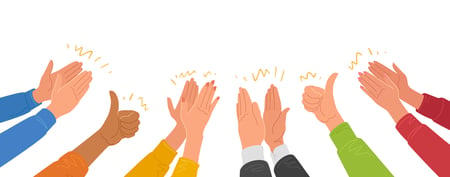What is sales culture? Sales culture is the attitude, behaviors and habits your sales team exemplifies at a particular time and place. An organization’s sales culture is important when sales and appointments are up and when they’re down. A positive, successful sales culture can bring out the best in your team. The opposite is also true. When building a great culture for a SaaS sales team, some key considerations may differ from other companies.
Consider the following characteristics to understand if your organization has a great sales culture and how to continually improve on it.
Table of Contents
How can you know what needs to be changed if nothing is written down to begin with? Similar to a mission statement or core values, your organization should have a sales culture definition that’s customized. Your organization’s sales culture definition can be a sentence or just a collection of words that act as a guiding principle. Consider the answers to these questions:
By considering these questions and jotting down the answers, it becomes easier to understand when your sales culture is slipping, who isn’t a great fit for your organization, and the type of talent you’re looking to bring to your team. Your team should be able to answer the questions: what is sales culture, and what does it mean for this organization? By nurturing these conversations, organizations can cultivate a culture that supports SaaS sales professionals' unique needs and challenges and drives their success in the dynamic SaaS industry.
In the fast-paced world of sales, a robust sales culture can be the differentiating factor between a thriving, high-performing team and one that struggles to meet targets. It sets the tone for collaboration, communication, and the achievement of goals. But what exactly is the impact of a great sales culture?
According to research conducted by Gallup, highly engaged salespeople achieve a remarkable 20% increase in sales. This statistic highlights the direct correlation between employee engagement and sales performance. When salespeople feel motivated, supported, and connected to their work, they are more likely to put in the effort and energy required to excel. By cultivating a sales culture that nurtures and supports its team members, organizations can unleash the full potential of their sales force.
Executed well, healthy competition within your sales culture can positively impact everyone on the team. Fostering healthy competition requires transparency into team and personal performance – a must-have quality of all teams and organizations in and outside of sales.
Additionally, healthy competition introduces motivational factors, camaraderie and sharing of best-practices among team members. Increased communication and collaboration, as well as accountability are natural outputs that also serve as tremendous assets for your sales culture.
Read More: How to Hold Your Team Accountable When You Never See Them
Achieving a sales culture of healthy competition is crucial for driving motivation, productivity, and success, especially within SaaS sales teams. Research shows that sales teams with high morale are 21% more profitable and 17% more productive. These statistics highlight the tangible benefits that a culture of healthy competition can bring to organizations.
When individuals are engaged and continuously improving, the entire team benefits, leading to increased profitability and productivity. A sales culture of healthy competition fosters a drive for excellence within the sales team, motivating each member to strive for their personal best and surpass previous achievements.
In the context of SaaS sales teams, a culture of healthy competition becomes even more crucial. The rapidly evolving nature of the SaaS industry necessitates a relentless pursuit of innovation and customer satisfaction. By fostering healthy competition, SaaS sales teams are driven to stay at the forefront of technological advancements, deliver exceptional customer experiences, and outperform competitors.
The circumstances in which your team is selling change frequently. Their approach at the start or end of a fiscal year could be different from halfway through a fiscal year. Economic, political and even social events that send ripples through industries can be caused to course-correct. A great sales culture prioritizes continual learning and development, so the team’s tool belts are always expanding.
Specifically, SaaS salespeople require a deep understanding of the technology they are selling. Building a culture that promotes continuous learning and development in technical knowledge is crucial. Providing opportunities for training and staying up-to-date with the latest advancements in the SaaS industry helps salespeople effectively communicate the value of the product and address customer concerns.
This learning and development can come in many forms: regular sales coaching as well as courses or certifications that can be taken independently. Sales managers must monitor sales performance metrics to understand specific areas of weakness and always work to improve.
Read More: This is How a Growth Mindset Training Can Help Your Sales Team
 Continual learning and development are paramount for sales teams, particularly in the context of SaaS sales where the business landscape evolves rapidly. To ensure success, it is crucial to identify the areas where your SaaS sales team faces pain points or struggles. Understanding these challenges can guide you in providing targeted up-skilling opportunities and fostering the development of new capabilities.
Continual learning and development are paramount for sales teams, particularly in the context of SaaS sales where the business landscape evolves rapidly. To ensure success, it is crucial to identify the areas where your SaaS sales team faces pain points or struggles. Understanding these challenges can guide you in providing targeted up-skilling opportunities and fostering the development of new capabilities.
In a Sales Insights Lab poll, it was revealed that 54% of respondents found it increasingly challenging to engage with prospects compared to five years ago. If your SaaS sales team faces a similar situation, it is imperative to consider investing in ongoing training initiatives and innovative courses. These resources can equip your team with the skills necessary to adapt to changing challenges, deliver value to customers, and thrive in today's dynamic sales environment.
By offering continuous learning opportunities, such as industry-specific workshops, product training sessions, or coaching from seasoned sales professionals, you empower your SaaS sales team to overcome obstacles and seize new opportunities.
Don’t misunderstand the role that agility plays in your sales culture. Having an effective sales funnel process as the cornerstone of your sales efforts is essential. What must be avoided is the adage “this is the way we’ve always done things.” In the spirit of continual learning and development means employing new tactics or approaches in an attempt to optimize the process.
With an effective sales funnel process grounded in data, your team can always look to the numbers to understand if new tactics or approaches are worthwhile.
When applied to a sales culture, an agile mindset brings numerous benefits and plays a pivotal role in building successful customer relationships.
We’ve instilled an air of healthy competition, and accountability and proactivity soon follow. Those efforts should be celebrated. The importance of recognition from leadership, as well as peer-to-peer recognition cannot be overstated. However, praise can definitely be overdone. It loses its meaning and importance when offered too regularly. A successful learning and coaching culture focuses on what sellers are doing right and where they are strong before moving on to areas of improvement.
Read More: How to Build a World-Class Sales Team
 In the dynamic world of SaaS sales, motivation and engagement are vital factors that contribute to a high-performance sales culture. According to former Hoopla CEO and Founder Mike Smalls, only one-third of sales reps are motivated and engaged at any given time. Recognizing the efforts and achievements of salespeople can play a transformative role in boosting their motivation, engagement, and overall job satisfaction. Let's explore how organizations can foster a sales culture of recognition and why it is of paramount importance.
In the dynamic world of SaaS sales, motivation and engagement are vital factors that contribute to a high-performance sales culture. According to former Hoopla CEO and Founder Mike Smalls, only one-third of sales reps are motivated and engaged at any given time. Recognizing the efforts and achievements of salespeople can play a transformative role in boosting their motivation, engagement, and overall job satisfaction. Let's explore how organizations can foster a sales culture of recognition and why it is of paramount importance.
First and foremost, recognition is a powerful tool for acknowledging the hard work, dedication, and accomplishments of sales professionals. When salespeople feel appreciated and valued, they are more likely to go above and beyond, striving for excellence in their performance.
It's crucial to frequently assess the impact of sales culture within your organization, understanding its current state and the role it plays. While there’s no one-size-fits-all method, focusing on the must-haves mentioned above can influence your organization’s sales culture. This, in turn, impacts your team members and facilitates your company's growth.
Funnel Clarity provides sales coaching for individuals and teams, ensuring the process of transparency, accountability, and continuous improvement becomes a part of your company’s sales culture. Reach out today to schedule a free conversation to discuss your sales culture.

Jill Ulvestad is the founder of Funnel Clarity. Jill applies her expertise in driving sales performance and results, developing sales strategy and streamlining skills development to the Funnel Clarity team. With nearly 20 years of business development and consulting experience, Jill provides valued sales performance insight to her roles as co-founder and managing partner of Funnel Clarity. Previously, Jill spent 8 years with the sales performance firm Huthwaite where she served as the Vice President of Sales. She most recently was co-founder of Business Performance Partners, a sales and strategy consulting firm and led the coaching practice.